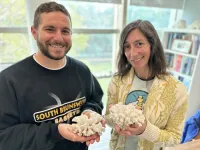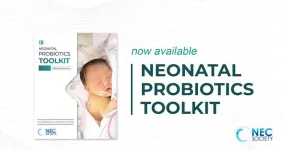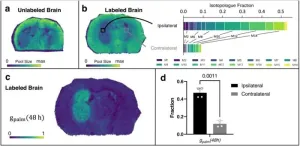(Press-News.org) A new study of 3,745 families from across the UK demonstrates a “sizeable” gap in the financial knowledge of children depending on which socio-economic group they come from.
The research highlights significant inequalities in young people’s financial capabilities, with the results pointing toward disadvantaged children not developing key financial skills.
In findings published in the peer-reviewed British Journal of Educational Studies, an expert team from UCL are calling for a greater emphasis on developing financial skills amongst children starting at primary school, particularly aimed towards those from disadvantaged social backgrounds, with “a particular need to consider how financial education is provided” for this group.
“There has been much concern in the UK about a lack of social mobility and the propensity for educational and social disadvantage to perpetuate across generations. This includes intergenerational cycles of money problems, poverty, and debt, which may be linked to socio-economic inequalities in the financial capabilities of young people.
“With sizeable socioeconomic gaps emerging, the issue of inequality in financial capabilities needs more public scrutiny and debate,” lead author Professor John Jerrim, from the Social Research Institute at UCL, explains.
“What we find in our study is children from more disadvantaged backgrounds are less likely to report covering money issues during their school lessons, with a particularly large socio-economic status gap in financial education provision towards the end of primary school.
“The gaps emerge early in life and can often persist into the teenage years. Only part of these gaps can be explained by differences in children’s cognitive and socio-emotional skills. It seems that socio-economic differences in financial capabilities may not merely be a reflection of inequalities in these other areas.
“Our results generally suggest that it may be helpful for young people from disadvantaged backgrounds to be engaged with about money earlier in their lives.”
The study used a nationally representative data sample taken from the 2019 Children and Young People’s Financial Capability Survey, measuring the financial capabilities and behaviours among British 7 to 17-year-olds. The authors then carried out online and face-to-face parental questionnaires.
Their findings show financial knowledge is far stronger for those children from wealthier backgrounds – with those young people from affluent background having greater exposure to financial education before secondary school.
Part of the issue, the experts found, is to do with the interactions that children have with their parents. Those from more disadvantaged backgrounds have less frequent money conversations with their parents and are “less likely to be shown how money ‘works’” by their caregivers.
“However,” adds, co-author Dr Jake Anders, Deputy Director of the UCL Centre for Education Policy & Equalising Opportunities, “whilst we find these parental interactions can account for part of the socio-economic gap in money confidence, money management, financial connections, and financial behaviours, these interactions are less important in boosting financial abilities”.
The authors state that going forward government and financial providers could, potentially, play a more important role.
“Disadvantaged children are much less likely to have a bank account – particularly when they are young – which may mean they are less likely to develop a firm connection with the financial world. To help improve financial connection – particularly aspects of their mindset and skills – more could be done to encourage use of financial services amongst disadvantaged socio-economic families and their children.
“This might include, for instance, a young person’s account linked to the government’s Help to Save account available to those with low incomes which effectively pay higher rates of interest and provide rewards for positive saving behaviours.”
Limitations of this research, funded by St James’s Place Wealth Management, includes only one parent taking part in the survey. The quality of some of the measures available was also limited, such as the information collected about children’s educational achievement and socio-emotional skills.
END
UK’s poorest children likelier to have less understanding of personal finances, study finds
Experts call for curriculum improvements as they find children from lower socio-economic groups not building key financial skills
2023-06-02
ELSE PRESS RELEASES FROM THIS DATE:
ASCO 23: Thyroid cancer precision approaches that incorporate targeted therapies and other treatments are changing the surgeon’s role
2023-06-02
DOWNLOADABLE B-ROLL/VIDEO
MIAMI, FLORIDA (June 1, 2023) – Historically, surgery was the first line of treatment for patients with thyroid cancer. Now, as targeted therapies and other new medications emerge, surgery for certain patients may become more of a secondary option if those treatments fail. This new context could potentially change how some procedures are conducted.
Otolaryngologist and head and neck surgeon Dr. Zoukaa Sargi, will join a June 2 panel discussion on thyroid cancer care ...
Medical College of Wisconsin cancer researcher & key investigator on study of Pirtobrutinib, now FDA approved for patients previously treated for Mantle Cell Lymphoma
2023-06-02
In a multicenter phase 1 and 2 trial (BRUIN, NCT03740529), researchers from leading cancer centers across the globe, including the Medical College of Wisconsin (MCW) in Milwaukee, tested Bruton tyrosine kinase inhibitor (BTKi), pirtobrutinib, in patients with pre-treated mantle cell lymphoma (MCL). Results of the study, which assessed the efficacy of the drug in a cohort of 90 patients with poor survival prognosis, demonstrated the reversible BTKi drug to be both safe and effective in achieving inhibition of defective B-cells. The results were published by the Journal of Clinical Oncology on May 16.
MCL is an aggressive, rare subtype of ...
Researchers develop new detection tool for beech leaf disease’s nematode pest
2023-06-02
Beech leaf disease is an emerging threat to North American forest ecosystems. It was first discovered in northeastern Ohio in 2012, and has already spread to 12 additional U.S. states and Canadian provinces. At first the cause of the disease was unknown, and the sick and dying trees were diagnosed on symptoms alone: Dark banding along the leaf veins and shriveled, leathery leaves. But in 2017, nematodes were found in diseased leaves, and by 2020 we had the answer: A newly recognized subspecies of the wormlike creature, Litylenchus crenatae mccannii, was definitely associated with the symptoms.
In order to monitor the spread of the disease, to understand the nemotode’s ...
St. Jude finds NLRP12 as a new drug target for infection, inflammation and hemolytic diseases
2023-06-01
(MEMPHIS, Tenn. – June 01, 2023) Infections and other diseases can cause red blood cells to rupture, releasing the oxygen-binding molecule hemoglobin, which breaks down into heme. Free heme can cause significant inflammation and organ damage, leading to morbidity and mortality. Researchers from St. Jude Children’s Research Hospital discovered NLRP12, an innate immune pattern recognition receptor, to be the key molecule responsible for inducing inflammatory cell death and pathology in response to heme combined with other cellular damage or infection. The finding provides a new potential drug target to prevent morbidity in certain illnesses. ...
Ancient viruses discovered in coral symbionts’ DNA
2023-06-01
HOUSTON – (June 1, 2023) – An international team of marine biologists has discovered the remnants of ancient RNA viruses embedded in the DNA of symbiotic organisms living inside reef-building corals.
The RNA fragments are from viruses that infected the symbionts as long ago as 160 million years. The discovery is described in an open-access study published this week in the Nature journal Communications Biology, and it could help scientists understand how corals and their partners fight off viral infections today. But it was a surprising find because most RNA viruses are not known ...
NEC Society launches neonatal probiotics toolkit
2023-06-01
Davis, CA - The Necrotizing Enterocolitis (NEC) Society is thrilled to release the Neonatal Probiotics Toolkit. The Toolkit provides structure to clinicians in neonatal intensive care units (NICUs) as they consider the complex process and decision of whether to implement probiotics to help prevent NEC. The Toolkit is not a recommendation for or against the routine use of probiotics in the NICU, nor for or against the use of any product or preparation method.
NICUs and clinicians are encouraged to use the Toolkit to foster thoughtful, intentional dialogue and inclusive conversations amongst key stakeholders in the NICU, including the need for patient-families to understand ...
Cancer cells rev up synthesis, compared with neighbors
2023-06-01
Tumors are composed of rapidly multiplying cancer cells. Understanding which biochemical processes fuel their relentless growth can provide hints at therapeutic targets.
Researchers from Washington University in St. Louis have developed a technology to study tumor growth in another dimension — literally. The scientists established a new method to watch what nutrients are used at which rates spatially throughout a tissue.
By using this multidimensional imaging approach, they identified pathways whose activities are uniquely elevated in brain cancer, offering clues for potential treatment strategies. The study was published May 19 in Nature Communications.
“We ...
Eye drops slow nearsightedness progression in kids, study finds
2023-06-01
COLUMBUS, Ohio – The results of a new clinical trial suggest that the first drug therapy to slow the progression of nearsightedness in kids could be on the horizon.
The three-year study found that a daily drop in each eye of a low dose of atropine, a drug used to dilate pupils, was better than a placebo at limiting eyeglass prescription changes and inhibiting elongation of the eye in nearsighted children aged 6 to 10.
That elongation leads to myopia, or nearsightedness, which starts in young kids and ...
New LUX search tool offers unprecedented access to Yale’s vast collections
2023-06-01
New Haven, Conn. — Yale University’s museums, libraries, and archives contain vast troves of cultural and scientific heritage that fire curiosity and fuel research worldwide. Now there’s a simple new way to make astonishing connections among millions of objects.
Starting today, anyone can explore the university’s unparalleled holdings online through LUX: Yale Collections Discovery — a groundbreaking discovery and research platform that provides single-point access to more than 17 million items, including defining specimens ...
Bremen researchers cultivate archaea that break down crude oil in novel ways
2023-06-01
Microbial communities are especially active near hydrothermal seeps like those in the Guaymas Basin in the Gulf of California. The team of researchers has been working on understanding these communities for many years. Organic material deposited in the Guaymas Basin is cooked by heat sources from within the Earth, which breaks it down into crude oil and natural gas. Their components provide the primary source of energy for microorganisms in an otherwise hostile environment. In their latest study, the researchers have demonstrated that archaea use a previously unknown mechanism to degrade liquid petroleum ...
LAST 30 PRESS RELEASES:
Cost of copper must rise double to meet basic copper needs
A gel for wounds that won’t heal
Iron, carbon, and the art of toxic cleanup
Organic soil amendments work together to help sandy soils hold water longer, study finds
Hidden carbon in mangrove soils may play a larger role in climate regulation than previously thought
Weight-loss wonder pills prompt scrutiny of key ingredient
Nonprofit leader Diane Dodge to receive 2026 Penn Nursing Renfield Foundation Award for Global Women’s Health
Maternal smoking during pregnancy may be linked to higher blood pressure in children, NIH study finds
New Lund model aims to shorten the path to life-saving cell and gene therapies
Researchers create ultra-stretchable, liquid-repellent materials via laser ablation
Combining AI with OCT shows potential for detecting lipid-rich plaques in coronary arteries
SeaCast revolutionizes Mediterranean Sea forecasting with AI-powered speed and accuracy
JMIR Publications’ JMIR Bioinformatics and Biotechnology invites submissions on Bridging Data, AI, and Innovation to Transform Health
Honey bees navigate more precisely than previously thought
Air pollution may directly contribute to Alzheimer’s disease
Study finds early imaging after pediatric UTIs may do more harm than good
UC San Diego Health joins national research for maternal-fetal care
New biomarker predicts chemotherapy response in triple-negative breast cancer
Treatment algorithms featured in Brain Trauma Foundation’s update of guidelines for care of patients with penetrating traumatic brain injury
Over 40% of musicians experience tinnitus; hearing loss and hyperacusis also significantly elevated
Artificial intelligence predicts colorectal cancer risk in ulcerative colitis patients
Mayo Clinic installs first magnetic nanoparticle hyperthermia system for cancer research in the US
Calibr-Skaggs and Kainomyx launch collaboration to pioneer novel malaria treatments
JAX-NYSCF Collaborative and GSK announce collaboration to advance translational models for neurodegenerative disease research
Classifying pediatric brain tumors by liquid biopsy using artificial intelligence
Insilico Medicine initiates AI driven collaboration with leading global cancer center to identify novel targets for gastroesophageal cancers
Immunotherapy plus chemotherapy before surgery shows promise for pancreatic cancer
A “smart fluid” you can reconfigure with temperature
New research suggests myopia is driven by how we use our eyes indoors
Scientists develop first-of-its-kind antibody to block Epstein Barr virus
[Press-News.org] UK’s poorest children likelier to have less understanding of personal finances, study findsExperts call for curriculum improvements as they find children from lower socio-economic groups not building key financial skills






